Introduction
On the 12th of November 2024, before the start of the first ever level 1 IFS training in Aotearoa New Zealand, the training team and some partners gathered in a spirit of formation, at the waharoa, entrance of the Marae in Morison Street, Taupo, in the centre of the North Island. The purpose was to take part in a pōwhiri, the Māori welcome ceremony, which involves a whaikōrero (formal speech), waiata (singing) and kai (food). For us, we also slept overnight in the big room together as a training group, ahead of an early morning of martial arts practice, shared breakfast, and singing. The intention of the event was to welcome the training team and IFS to the land of the long white cloud (Aotearoa).
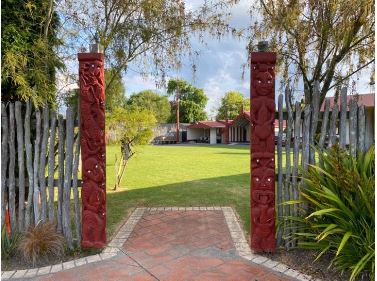
Our visit was the realization of a vision held by Simon d’Orsogna, as the local organiser and International Partner of the IFS Institute, pioneering to bring IFS to his homeland Australia and then to New Zealand, an idea growing since since 2012. He first ran small groups in Melbourne and Sydney, ahead of a series of semi-annual workshops from 2013 bringing Bonnie Weiss to Australia, then with the first official IFS Institute L1 training which have run each year following in increasing numbers, since the inaugural offering in 2017 with Paul Ginter. Simon offers expansive adult learning experiences using systemic approaches for mental health professionals, with a focus on IFS and also integrating Constellations. His intention has been to grow a vibrant IFS community in the Great Southern lands, an emergent reality now has become real now that more than 500 local practitioners have been trained in from the IFS Institute’s model of teaching since he began.
Simon organised his first Introduction to IFS workshops in New Zealand in 2018, with the collaboration of Richard Fox and Jan Hudson, both kiwis (local NZers) assisting on this inaugural training. Richard Fox was one of the first in the region to train in IFS, taking himself to the States to complete L3 years before it was more generally available in Australia. Simon is passionate about IFS as a model for general wellbeing, as much as to support mental health specifically. He sees this as broadening IFS’s reach and appeal, underlining the emotional and spiritual connections that are foundations of relational belonging. This sense of connection extends to our own internal aspects or parts, then out to partners, family, friends and community. Personally, he has found IFS so helpful as a modality of healing, growth and elaboration. Simon’s intention for New Zealand is to more than double the number of IFS trained mental health professionals by offering this level 1 training. He sees IFS as a trauma-processing modality, fitting very well with traditional Māori healing as well as more recognised ways of working.
Simon intended initially the training team might be brought to a Marae to gain a sense of togetherness and community. Local IFS Consultant Jane Currie and her partner Mike Beatie were active in arranging the event, involving their local iwi (tribe) connections from neighbouring Rotarua. Simon had learnt from many years of group work that hosting teams need time to arrive, attune, and bond, so subsequently he has worked to prepare unified teams, bringing these together at least a day before the training starts. He learnt from group psychodynamic processes this initial process has made a big difference to the way that the team can then hold a larger dynamics of the participant group, because the training team itself is harmonized and clear. The intention in this pre-bonding is to amplify the possibility of noticing when the group dynamics shift, or start playing out in the room. As staff for this training Emma Diamond, Loranie Leas and Cath Leith made up the training team for this first Level 1 event in Aotearoa New Zealand.
At the Marae, the group was drawn together by the acknowledgement of place, time, history and context, acknowledging the first people. Simon says oft this “systemically makes a recognition, not only of belonging but recognises who comes first; the parents coming before children, grandparents coming before parents, founders before followers, the one who has been here longest deserving an acknowledgement and honouring, ahead of the people who came here just a moment ago.”
During the ceremonies of sharing at the marae, we were invited to pay attention to something that is both personal and transpersonal, more rooted in the natural world, that is also about belonging and an understanding of life from a Māori perspective. We were invited to feel that we all belong. This invitation expressly affirmed that we are all part of a larger tribe (iwi), where we can gain a sense of right scale, right order and right place, coupled with listening to find our place and sensing the heart-led welcome. The marae and how we were hosted there emphasised all of that, as well as beautifully illustrating through personal experience what culture is and how culture is expressed. On reflection, our collective experience was beyond any in the group’s expectations, as the spirit of the people who facilitated our time there helped us firm up our understanding of the world, other people and how we are with each other. Underneath our experience at the marae lies a sense of larger purpose, encouraging us to get into right action, based on the revelation that we are an organic expression of a larger moment of life. We profoundly gained a sense of the Māori core values of pono (truth), whanu and whakapapa (family and ancestors), and aroha (love).
Simon hopes that future IFS trainers will see the value of spending time with their teams prior to the training days, so that a structure is created where there is adequate space and time for connection, resulting in group members being more aligned internally and with each other, before launching into the task of training participants. He concluded that, “we need time to align, centre and come into a consonance, otherwise we arrive in dissonance. The process then strengthens the container and empowers the hosting group to hold the participants, as they sense us in harmony with each other during their time together.”
National context
Our visit came at a disturbing, poignant time in the general affairs of the Māori people. The New Zealand Parliament was debating a controversial bill that proposes to radically alter the way New Zealand’s Waitangi 1840 treaty between Māori and the Crown is interpreted. The Treaty principles bill was tabled by the Libertarian Act party – a 7% minor party in New Zealand’s coalition government. Its first reading was met with scathing speeches and disruptions, including a haka led by an MP, supported by members of the public in the gallery. A protest march (hikoi) in the north island was organized, bringing awareness of the bill to the public. If passed into law, it would remove a set of well-established principles that flowed from the founding Treaty document. Power of interpretation of the principles would be removed from the courts and vested instead in Parliament. The treaty signed by 500 Māori chiefs and the Crown was instrumental in upholding the rights of the Māori people. If the proposed bill is passed into law, principles, including the position of the Māori language being an official language, would be threatened. There have already been changes, such as the dismantling of the Māori health authority. Successful or not at undermining the treaty by stripping rights, in the short term such moves create division by licensing grievances and by damaging the relationship between Māori and ruling authorities.
Our visit – what is a marae?
A marae is a fenced-in complex of carved buildings and grounds that belong to a particular iwi (tribe), or family. For the Māori people a marae is a sacred communal place, a focal point that serves religious and social purposes – their place to stand and belong. Its main building is a wharenui, the carved meeting house where guests are accommodated. Other buildings include a whaarekai (a dining hall and cooking area), and a toilet and shower block.
Why did we come to the Marae?
There were two main purposes for our visit. The first was to root our IFS training in the wisdom of the culture of the original settlers of Aotearoa; for our training to be seen by them as important for the mental health of all people who live on these beautiful islands. This we sort to do by humbly coming in peace and love to the Marae. Secondly, through the experience of being in the sanctuary of the Marae, to come together as a hosting group, inaugurating the power of our own collective Self-energy to support this Aotearoa training.
What happened in the process?
We, the manuhiri (visitors), were greeted by the avuncular Bronson Perich, who reassured us that we were about to be invited into a very special place. He shared with us the unique Māori process of strangers (manuhiri) gaining entrance through the waharoa to a Marae. After Bronson’s reassuring explanation, we were called onto the Marae by a lone female voice in the form of Anne-Marie the kaikaranga (woman caller), with the female members of our group leading, metaphorically showing that we were coming in peace. They were followed by the males in our group. Once inside the Marae the men were required to be seated in front of the women, in case the women had to be protected from violence of action or speech, should our visiting group not show that they could be trusted as family and friends.
Bronson, on behalf of the Marae, began a highly skilled oration, with ritual and gesture that challenged us to determine our intent, which once established clears the way for the rest of the welcome ceremony. He described who he is in relationship to the land, nature and his tribe (the mountains and rivers known to his family (fanu), ancestors (whacapapa), and himself. He gave us information which identified him and his tribe, so that we as manuhiri (visitors) would be clear about the cultural heritage of this Marae.
In response, our ceremonial leader, in the form of Hone, a veteran Māori special services soldier, spoke on our behalf. We were all spellbound by Hone, a humble man who had especially come to be with us this day, following the poignant funeral of the last soldier from the Māori expeditionary force. We felt deeply honoured by his presence.
As we watched and listened to his powerful oration we witnessed his amazing qualities as an orator. His very being appeared to be transformed, seeming almost to grow taller, as the power and connections of his oratory convinced our hosts that we were a group who could be trusted and inducted into the special knowledge of what it means to be Māori.
Hone explained that we had come as peaceful people who help to heal others who are suffering in their minds. He argued that through our vocation we were spiritually connected to the tribe; therefore, could be trusted as though we were family. He argued too, sometimes with great humour, that he and Bronson were related. In fact, he could be described as Bronson’s uncle and therefore a family member! This rhetoric and our koha (gift/offering), symbolizing thanks to the hosts for their manaakitanga (hospitality) clinched our acceptance into the Marae, which the energetic Benoir confirmed.
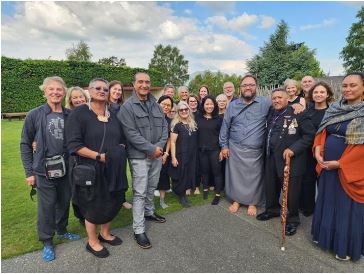
We were then able to exchange personal greetings in the form of a hongi, which involves the shaking of hands and a gentle pressing of noses, signifying sharing the sacred breath of life – the maori (life principle). Group members were further welcomed by the sharing of delicious kai (food), which was followed by the setting up of our communal sleeping space.
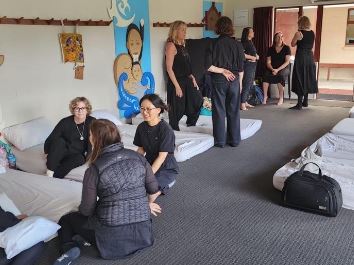
Our enriched evening
The evening was enriched through a special gathering, which gave each of us the opportunity to share about who we are and our link to our land and ancestors. Each was invited to hold a tao (spear) in a ritual way that represented our current state of being.
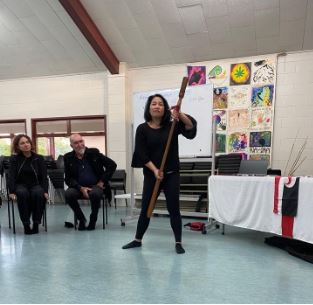
Any attempt to describe the content of this time together would not do justice to the richness of personal stories that were shared during our evening together. Suffice it to say that we were all deeply moved, as each one opened their heart to the group and gave special insights into their personal journey. The process truly bonded us as a group, as we felt the vulnerability, joys and pains of each other’s experience of existence.
Following a short break Benoir inducted us into the intricacies of his mother tongue, revealing its hidden mysteries through letters, symbols and numbers, which help make sense of the world. His session left us with a clearer understanding of the cultural richness of his Māori heritage.
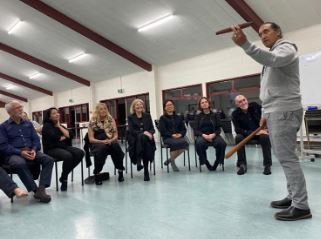
Off to bed! This was, for most of us, a unique experience as we spent the night together in a dormitory sleeping on the ground on our individual mattresses. The arrangements for the night flowed remarkably in good spirit and soon there was a palpable peaceful energy that invited us to slumber.
Alarm!
Just after 5am we were brought from our sleep by Benoir’s morning alarm call! We became aware that he was blowing through a conch shell. The bouncing air inside the shell produced sounds that are like the ocean that surrounds Aotearoa – a very natural alarm clock! Repeated clarion calls from the conch summoned us outside to experience exercise Māori style.
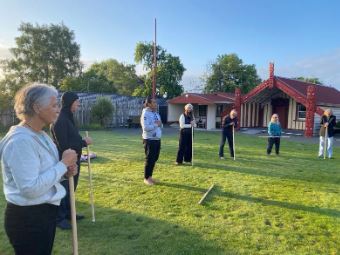
Benoir skilfully led us through a range of exercises that challenged us both physically and mentally. It became obvious why Māori warriors were recognised as formidable! As with so much of experience at the Marae we learned to let go and trust in the energy that flows through life. It certainly gave us a keen appetite for our breakfast!
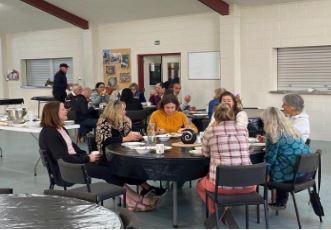
Partings
Our final session at the Marae gave us the opportunity to learn a song from Benoir – the catchy tune will live in our minds for a long time!
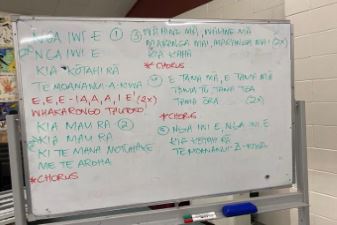
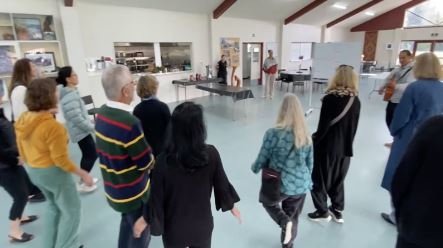
Emotionally filled goodbyes followed our singing; the beautiful melodic singing of Anne-Marie brought our time at the Marae to a close.
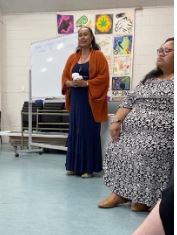
Our deep learning through experience
Each one of us had a shared experience but will have come away with our individual memories of the place and its authentic people. We left with a sense of deep gratitude for our initiation into Māori culture. We feel enormously privileged to have been in this group at this time, evincing such qualities allowed our parts to settle and our Self to show up.
Our hosts gave us insights which highlighted why there is so much to learn from Māori culture. As Benoir shared: “Our culture and philosophy are about the natural. They develop in each person a deep sense of being in flow and connecting to the oneness of creation. We understand that the divine can only work through us. The most important value for our people is pono – which translates as truth.”
We felt the deepest sense of gratitude for the love and care which we experienced in abundance. We came through the waharoa (gateway) as strangers, but left feeling we had each recognised the extended invitation to see ourselves as members of a wonderful people who will live in our hearts.
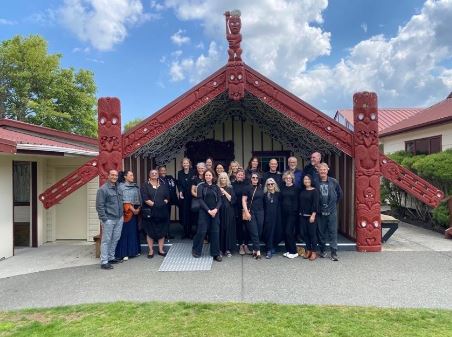
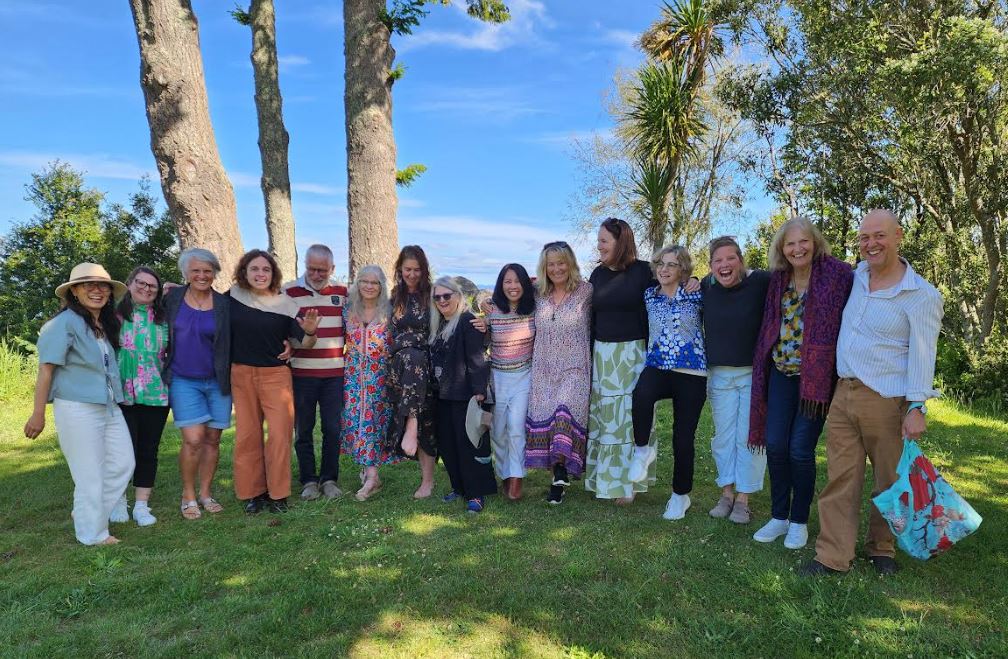
Trainers, trainers in training & Program Assistants Group.
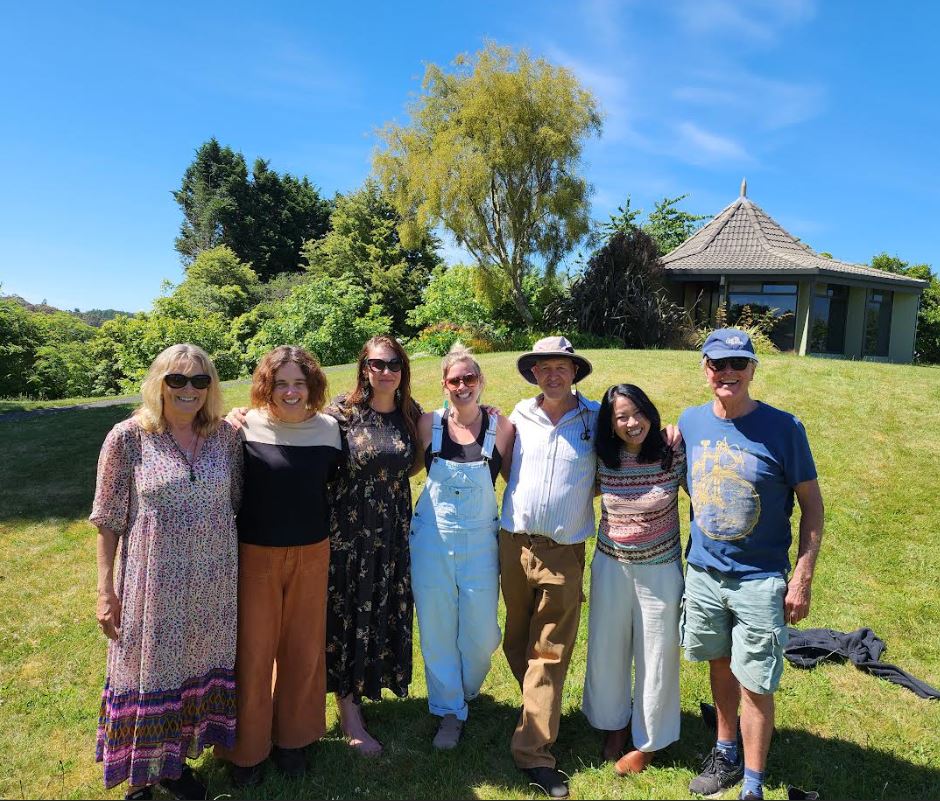
Trainer team – Emma Diamond, Jenny Fiebig, Loranie Leas & Cath Leith – trainers & trainers in training, & PA Jane Hawkes and her partner Neil Hawkes, (Neil is our article’s author – many thanks to him!).
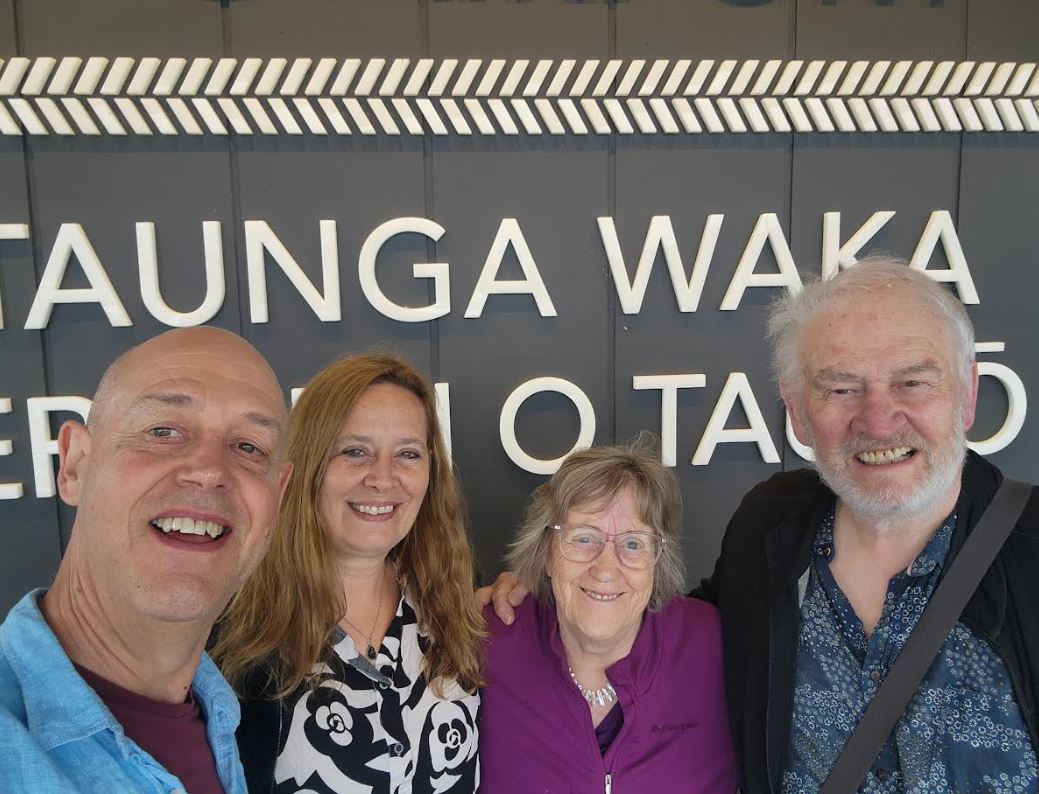
Directors and stewards of Tauhara Centre, Catherine & Stephen, with Simon and Gabriela.
Written by Neil Hawkes (UK), member of the IFS in schools collaborative, on behalf of the Group.
